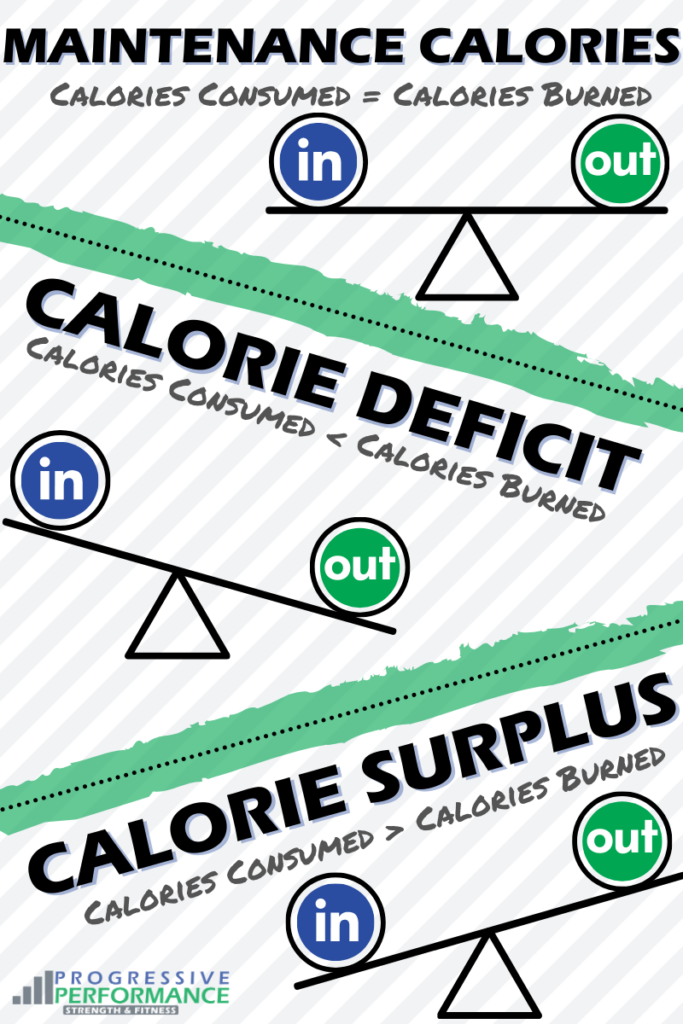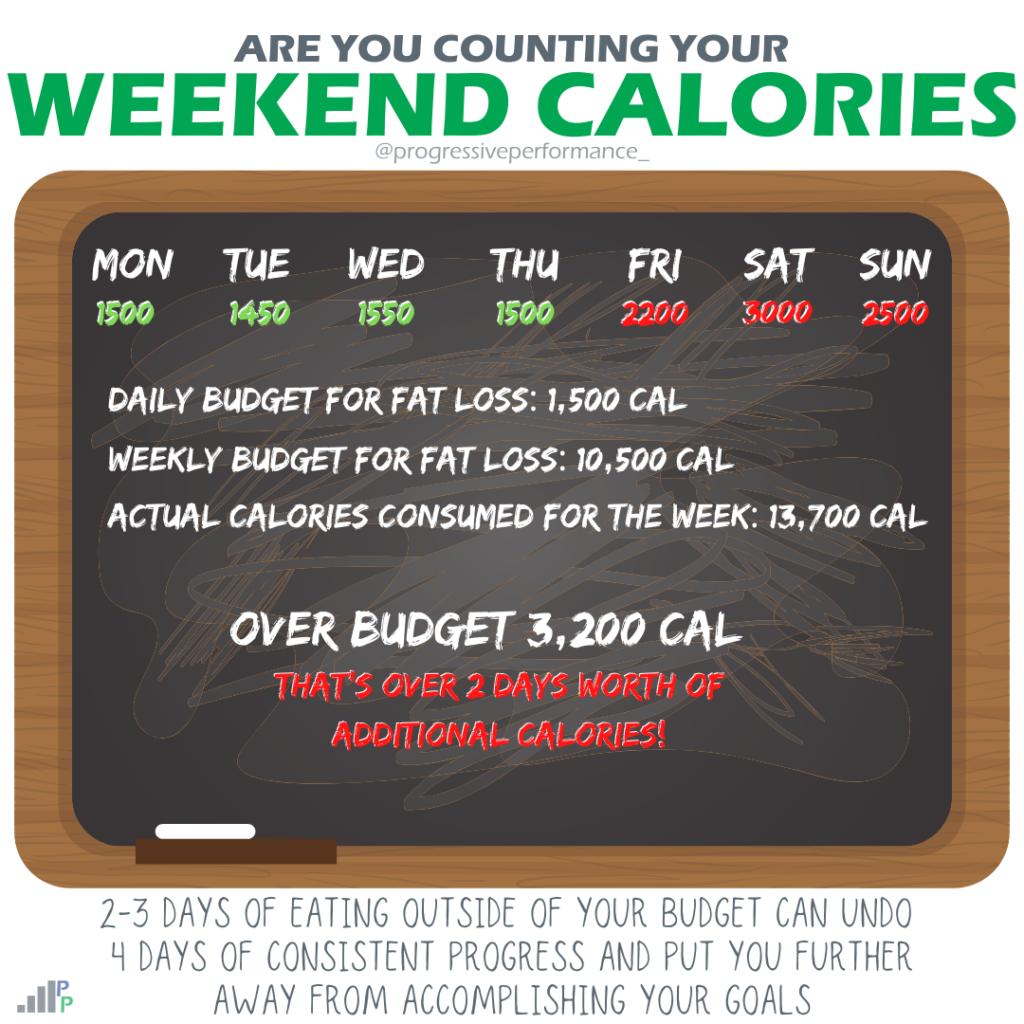Weight loss is really very simple, seeing the number on the scale decrease all comes down to a basic math problem. Are you taking in less calories than you are expending on a daily basis? Or more simply, are you eating less calories than you are burning on a daily basis? The types of foods and beverages you are eating doesn’t really matter, or even the diet strategy you are following (i.e. intermittent fasting, Paleo, ‘clean eating’, etc.). If the calorie balance math equation isn’t correct you won’t see progress in your weight loss.

Table of Contents
ToggleHow to Create a Calorie Deficit
In order to lose weight, you need to make sure that you are in a calorie deficit – on a daily and weekly basis. Calorie deficit is the term that nutrition coaches, dietitians, personal trainers, etc. use to describe the state of when the body is consuming less calories than are being burned (or expended).
There are two ways that a calorie deficit can be created, through nutrition (eating less calories) and through exercise (burning more calories). A healthy balance of both is the ideal way to elicit a calorie deficit for weight loss, but I find that focusing on nutrition is the simplest and most effective element for weight loss. Trying to outtrain poor nutrition is extremely difficult.
While you can get a myriad of tests done through a registered dietitian or doctor to get as close as possible to how many calories your body uses everyday to exist (i.e. breathing, digestion, biological functions that are not including specific exercise and non-exercise calorie use), most people don’t want to put that much effort and expense into discovering that data. In my opinion, if you are just trying to lose weight for improved health and confidence you really don’t need to know all that information to get started on your weight loss journey.
I use a very simple formula for my athletes and clients who want to lose weight, aiming for their daily calories to be between nine to eleven calories per pound of body weight.
Calorie Deficit = BW(lbs) x 9 to 11
Example: 150lbs x 11 = 1650cal
150lbs x 10 = 1500cal
150lbs x 9 = 1350cal
I always recommend the highest amount of calories to start, because that will give us room to cut calories if the client’s weight loss progress has slowed or hit a plateau. This formula takes into account that the client is active and exercises around 2-3 hours per week, so no need to try to track calories burned while walking, in the gym, doing yard work, etc. I always tell my nutrition and fitness clients, we don’t work out to try to earn calories, nutrition (food and beverages) is our body’s fuel so eat to fuel yourself properly.
Can the Daily Calorie Amount Be Too Low?
Yes, absolutely. Restricting your calories too low for too long will certainly have a negative impact on your metabolism, which will make losing weight more difficult. if you are regularly (4+ days in a row) eating under 1000 calories per day and aren’t under 100lbs I’m guessing that you probably aren’t seeing consistent weight loss.
Your body requires a certain intake of calories in order to perform basic functions, so if you are only meeting that requirement daily, your metabolism is working very efficiently (i.e. slowly) to preserve your energy stores so that you don’t reach a starvation state. I know it seems counterintuitive to eat more calories in order to lose weight, but remember calories are your body’s fuel and you don’t want to always be running on fumes. If it’s not good for your vehicle, it’s definitely not good for your body.
Hitting Your Calorie Budget for Weight Loss
Now that you know what your daily target for calories is you should start thinking about it as a daily (and weekly) calorie budget. I’ve got a really informative article about the importance of working towards a consistent calorie budget. What does that mean exactly? Many of my clients are rockstars during the work week, but then the weekend rolls around and the wheels fall off.

Just like trying to outtrain poor nutrition, trying to recoup overindulged calories is a losing game. You should not restrict your calorie intake the next day because you ate an additional 1000 calories the day before, but just jump back on your plan at your next meal. Improving your consistency and habits as you work towards choosing more nutrient-optimal foods and beverages will allow you to to still be able to enjoy all the things you like while still losing weight.
But What About Macronutrients?
Macronutrients are very important as well, it’s how our calories are derived. Carbohydrates, protein, and fats are the 3 nutritive macronutrients that help us to create a balanced diet that fuels our body. Each macronutrient has a calorie value, protein and carbohydrates are 4cal per 1gram and fat is 9cal per 1g. Alcohol is actually a macronutrient as well, but it’s non-nutritive so it’s not usually part of the discussion for creating a healthy nutrition strategy. The calorie value for alcohol is 7cal per 1g.
We need a healthy balance of the 3 macronutrients (carbohydrate, protein, fat), and figuring out what the correct balance for each individual person will help to make the calorie budget satiating and sustainable. Typical American diets are significantly low in protein consumption, people are getting between 10-13{885586236f5820200058e61f9e2fcec1023d525f8b1a6e4e5a4fd7f3c0d65acb} of their calories from protein. We really should be getting closer to 30{885586236f5820200058e61f9e2fcec1023d525f8b1a6e4e5a4fd7f3c0d65acb} of our daily calories from protein; I like to recommend that my clients eat anywhere between 0.8g – 1.2g of protein per pound of body weight. Increased protein consumption has several really beneficial effects for weight loss:
- Increased satiety – protein is digested slower which will make you feel fuller for longer
- Increased calorie expenditure – protein digestion takes more energy from our body (i.e. more calories burned)
- Provides your body with the building blocks for lean muscle growth
The other two macronutrients are a bit more flexible depending on what you like to eat, but the typical recommendation for the remaining 70{885586236f5820200058e61f9e2fcec1023d525f8b1a6e4e5a4fd7f3c0d65acb} of your calories is 30{885586236f5820200058e61f9e2fcec1023d525f8b1a6e4e5a4fd7f3c0d65acb} from fat and 40{885586236f5820200058e61f9e2fcec1023d525f8b1a6e4e5a4fd7f3c0d65acb} from carbohydrate.
So yes, macronutrients are very important to weight loss, but no more important than your calorie budget. To keep going with the car analogies… We need our car to have wheels in order to drive, but upgrading to higher performance tires will help with a smoother ride. The wheels are the calories, and the high performance tires are the macronutrients.
But what if you hit your protein goal and still go over on your calorie budget? Well, look a little closer at the question. If you go over in your calorie budget daily you are simply not going to lose weight, even if you are hitting (and exceeding) your macro goals.
Weight Loss: A Simple Equation, But a Challenge to Execute
Like I mentioned before, weight loss comes down to a very simple equation, but actually holding yourself accountable on a daily basis is where the difficulty lies. Having a support system around you and hiring a nutrition coach are a few of the most valuable pieces in helping with your health and fitness journey.
As a nutrition coach, I like to support my clients every step of the way. Providing education, inspiration, and support that helps each client stay accountable to the goals we are working towards. Our nutrition program aims to help you build healthy nutrition habits for life, allowing you to enjoy the foods you like while still reaching your scale and physique goals.
Are you ready to learn how to achieve your weight loss goals? Let’s chat! Send us an email to [email protected] to get started on your journey TODAY!



